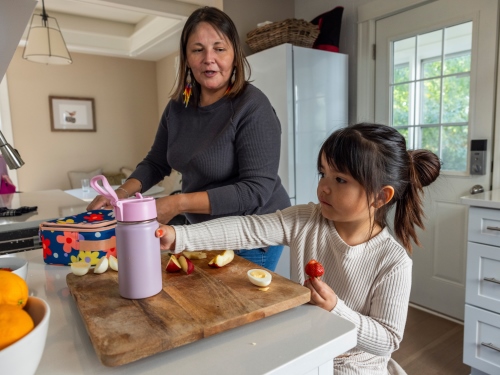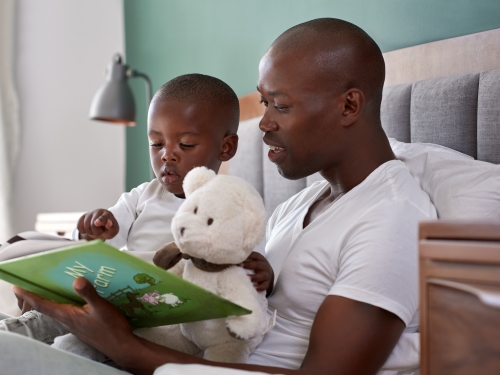(Posted 2025 August)
 As the new school year approaches, many families return to (or create) routines to help their children stay on track and thrive. The start of the school year is a great time to establish routines, but don’t worry, it’s never too late!
As the new school year approaches, many families return to (or create) routines to help their children stay on track and thrive. The start of the school year is a great time to establish routines, but don’t worry, it’s never too late!
What is a Routine?
A good routine creates a consistent way to do daily activities like getting dressed, eating meals, and going to bed. You probably have routines that you follow without thinking about them.
Why Are Routines Important?
Routines are helpful, but they aren’t just about getting out the door on time. They are key to helping children feel secure, confident, and successful. Routines set clear expectations, give children a sense of control, and help to develop essential life skills like self-discipline.
For parents, with just a little planning and consistency, routines can make everyday life smoother. They can be a game-changer!
Our Parenting Education Programs has some suggestions for routines at three crucial times of the day.
 Getting out of the door on time in the morning can be one of the biggest challenges during the school year. A solid routine for getting dressed is key to making mornings less stressful. Here are some tips:
Getting out of the door on time in the morning can be one of the biggest challenges during the school year. A solid routine for getting dressed is key to making mornings less stressful. Here are some tips:
Offer two choices: Allow your child to feel some freedom and control by asking them to pick between two preselected outfits. This keeps things simple and minimizes debate.
Plan Ahead: Pick out clothes together the night before! This saves valuable time and reduces confusion in the morning.
Practice Independence: Encourage younger children to put on as much of their outfit as they can. Start small with putting on socks, pulling up pants, or putting on a jacket. Every little success builds confidence.
Help When Needed: Step in where necessary, like tying shoes or zipping up jackets, but always encourage younger children to try first.
Celebrate Small Wins: Praise your child’s efforts. Confidence grows with encouragement.
 With the busy school year comes the challenge of keeping meals organized. Routines can help with packing a school lunch and ensuring mealtime stays a time to connect. Here’s how to build a positive mealtime routine:
With the busy school year comes the challenge of keeping meals organized. Routines can help with packing a school lunch and ensuring mealtime stays a time to connect. Here’s how to build a positive mealtime routine:
Let Kids Help Pack Lunches: Tackle this chore the evening before. Offer your child choices like baby carrots or cucumber slices, apples or grapes. This gives them ownership and helps to reduce wasted food.
Serve Manageable Portions: Remember that children have small stomachs. Whether packing lunches or serving dinner, give them kid-sized portions to start with and let them come back for seconds if needed.
Respect Their Preferences: Your child may not love every food you do, and that’s okay. Keep meals positive and adventurous and encourage them to eat the rainbow and to try new things.
Encourage Self-Feeding: Even younger kids can feed themselves with finger foods or practice using utensils. Independence builds confidence, so step back and let them try.
Maintain Family Mealtimes: Prioritize eating dinner together. This creates a space for kids to talk about their day and connect with you.
 A good day starts with a restful night’s sleep, and that’s where a consistent bedtime routine comes in. Children of all ages benefit from knowing what to expect before bed. It calms their minds and helps them feel safe to relax and wind down. Here’s how:
A good day starts with a restful night’s sleep, and that’s where a consistent bedtime routine comes in. Children of all ages benefit from knowing what to expect before bed. It calms their minds and helps them feel safe to relax and wind down. Here’s how:
Stick to a Schedule: Set a consistent time for bed—even on weekends—and start preparing for bedtime about 30 minutes to an hour in advance.
Slip into a Warm Bath: Bathtime can help relieve stress and ease children into bedtime. Let your child help with the water, choose bath toys, or add bubbles. Then transition to putting on pajamas and brushing teeth.
Read together: Read a short bedtime story or book chapter in your child’s bedroom. Keep the room quiet and dimly lit to signal it’s time to relax.
Put your child in bed. Falling asleep on their own teaches children to self-soothe and settle themselves if they wake up in the night.
Respond, then Redirect: If your child wakes up at night, offer comfort then return them to bed. This reinforces your routine without creating new habits like co-sleeping.
Setting a new routine can take some time, so be patient. Remember that flexibility and persistence are key. There may be some challenges but with consistent practice, routines will become a way of life for your child that supports their sense of comfort and maturity.
Parenting Education Programs (PEP) is offering several upcoming classes specifically to help you grow healthy relationships with your kids. Join us for more information about positive and effective ways parents and caregivers can interact with their children at every age and stage of development.
This posting is part of the Department of Family Services' Community Corner where you’ll find timely information about upcoming events, parenting and wellness tips, programs and services, and more! Share these helpful posts with your friends and family. Don't miss out on future postings! Sign up today!

